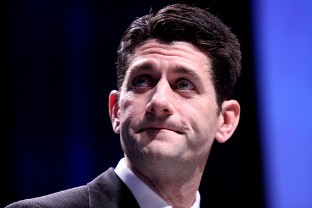Where’s the courage?

When House budget chair Paul Ryan (R., Wis.) announced his budget proposal for 2012, columnist David Brooks called it the "most courageous budget reform proposal . . . in our lifetimes." Ross Douthat praised it as "brutally honest." Jacob Weisberg said it was a "serious attempt to grapple with [our] long-term fiscal issues."
Ryan's proposal, which would overhaul Medicare and Medicaid and cut $4 trillion in taxes on wealthy people and corporations, is certainly aggressive, and it may prove politically risky. But that's not the same as honest, serious or courageous.
Ryan claims that along with trimming trillions from the federal budget over a decade, his plan would make unemployment plummet and federal revenues soar in the very first year. But he relies on assumptions that even conservative economists find unconvincing. Douglas Holtz-Eakin, who advised George W. Bush and John McCain, called Ryan's numbers "implausibly optimistic." Reagan-era budget director David Stockman flatly dismissed Ryan's claim that his proposal would drastically reduce unemployment.
Read our latest issue or browse back issues.
An honest, serious budget plan wouldn't use fuzzy math. It also wouldn't hide behind a bait-and-switch argument. The ostensible linchpin of Ryan's deficit-reduction plan is his idea of converting Medicare into a voucher program and Medicaid into a state-administered block grant. But he also curbs benefits in both programs, and it's those cuts, not the reforms, that would actually save money. Public health-care costs are too high, but that's not because they're public; all health-care costs are too high. Ryan's proposal masks this fact with boilerplate language about the benefits of privatization and local control.
If Ryan thinks the poor and the elderly should have to spend more on health care, he should say so directly—that would at least be honest. And it would certainly carry political risks, but it still wouldn't be courageous. Courage requires moral clarity, a commitment to defending what's right. Ryan is using the deficit as an excuse to shrink the government via tax relief for the rich and program cuts that largely target the poor—while sparing military spending. That isn't courageous; it's simply wrong.
Should Ryan at least be praised for offering a big-picture plan? Last fall, Representative Jan Schakowsky (D., Ill.) presented a plan that was just as bold: it raised upper-income and corporate taxes and aimed 90 percent of its cuts at the Pentagon. She wasn't praised for her courage. Her plan was met with a mix of indifference and scorn.
On April 12, President Obama outlined a moderate approach to cutting the deficit, one that follows the plan of his bipartisan commission. It would reduce spending in all categories and increase some taxes. Inevitably, the president's plan will be seen as defining the liberal side of the debate.
In fact, one of the most effective responses to the deficit would be to preserve some existing laws. Letting the 2010 health-care reform law go forward, instead of repealing it, would control health costs for everyone and drive down the deficit. And allowing the Bush tax cuts to expire as scheduled would do a lot to increase revenue. Those positions aren't flashy enough to win praise in the op-ed pages, but they are serious and courageous.






